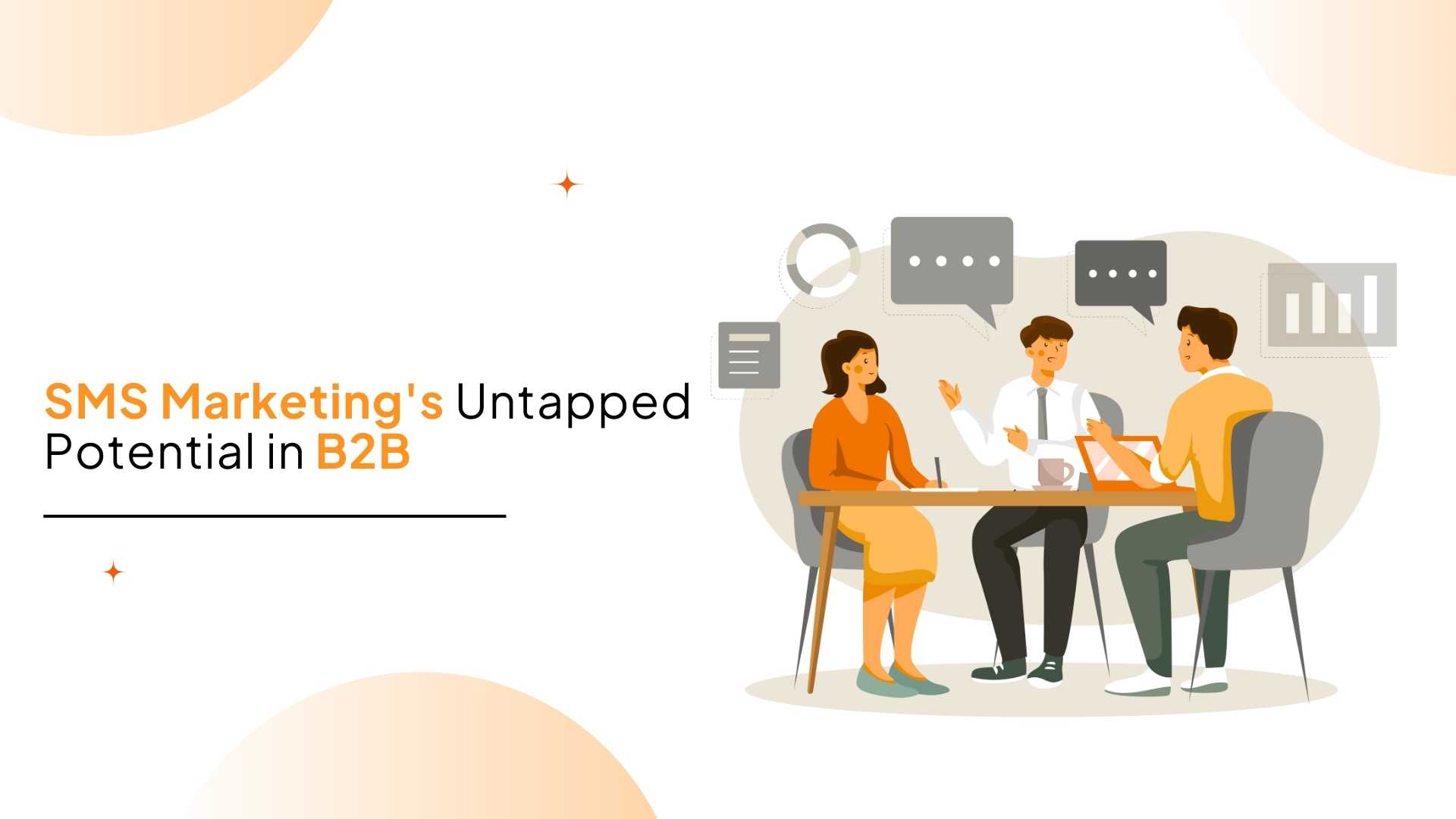

business marketing
SMS Marketing's Untapped Potential in B2B
SMS Marketing's Untapped Potential in B2B
SMS marketing has long been a go-to strategy for B2C companies, helping brands engage customers instantly with promotions, updates, and personalized offers. Its effectiveness in consumer markets is well established, thanks to high open rates and quick response times.
However, when it comes to B2B, SMS marketing remains largely underutilized. Many organizations still rely heavily on traditional channels like email, phone calls, or LinkedIn, often overlooking the potential of SMS for building stronger business relationships.
This article explores the untapped opportunities of SMS marketing in B2B, shedding light on why it deserves a place in modern business communication strategies.
Why SMS Marketing Matters for B2B
One of the biggest advantages of SMS marketing is its significantly higher open and response rates compared to email. While emails often get lost in crowded inboxes, text messages are read almost instantly, giving businesses a more reliable way to capture attention.
SMS also enables direct and instant communication with decision-makers. In B2B, where timely updates and quick responses can influence deals, this immediacy helps strengthen relationships and speed up business processes.
Additionally, with the growing shift toward mobile-first business communication, SMS has become an essential channel. Today’s professionals rely on their smartphones for work, making text messaging a natural and effective way to stay connected.
Current Misconceptions About SMS in B2B
Despite its effectiveness, SMS marketing is still overlooked in the B2B space due to a few common misconceptions:
1. “SMS is only for retail and promotions.”
While SMS is widely used in retail for flash sales and discounts, its value in B2B lies in efficiency and direct communication. Businesses can use it for meeting reminders, payment updates, event confirmations, or quick customer support-functions that go far beyond retail promotions.
2. “B2B buyers prefer long-form communication.”
It’s true that complex B2B decisions often involve detailed discussions, proposals, and documents. However, SMS complements these by delivering short, timely messages that keep the process moving-such as reminders, follow-ups, or quick status updates. Buyers appreciate brevity when it saves time.
3. “SMS isn’t professional enough for business use.”
In reality, professionalism depends on how the message is crafted. Clear, concise, and relevant SMS messages can build credibility rather than harm it. Many B2B companies already use SMS for two-factor authentication, appointment scheduling, and critical alerts, demonstrating its acceptance in professional contexts.
How SMS Works Behind the B2B Success
What makes SMS so powerful in the B2B space is its flexibility. It is not locked into one role; it can seamlessly support the entire business cycle, from prospecting to post-sale engagement.
Take lead nurturing for example. After a webinar or industry event, most companies rely on lengthy follow-up emails that often sit unopened in a crowded inbox. A short, timely text such as “Thanks for joining today’s session, here’s the link to the key takeaways” keeps the conversation alive without overwhelming the recipient.
When it comes to sales enablement, speed matters. A text reminder for a product demo or a quick alert about a newly released feature ensures prospects are engaged and sales teams stay top of mind. It is the kind of communication that turns interest into momentum.
Customer support and engagement also benefit. Imagine a client receiving an instant update that their support ticket has been resolved or that their order status has changed. SMS transforms what could feel like a waiting game into a transparent, responsive experience.
In event marketing, timing is everything. A last-minute venue change, a session reminder, or even directions to the registration desk can be delivered instantly via text, ensuring that attendees feel guided every step of the way.
And let us not forget the often-overlooked but critical side of business: payments and contracts. A polite SMS reminder about an upcoming invoice or pending approval does more than reduce administrative friction; it strengthens trust by keeping processes clear and on schedule.
Crafting Smarter Conversations: Best Practices for B2B SMS Marketing
The beauty of SMS in B2B is not just its immediacy but also its intimacy. Unlike emails that pile up in inboxes or LinkedIn messages that can feel transactional, a text lands directly in someone’s hand. That makes it powerful, but it also means businesses need to approach it with care. A clumsy message can feel intrusive, while a thoughtful one can strengthen relationships.
The first rule is personalization. A generic “Hi there” might work in mass retail, but B2B audiences expect relevance. Tailoring a message to a prospect’s role, recent interaction, or stage in the buying journey shows respect for their time.
Next comes compliance. Regulations like TCPA and GDPR are not just red tape; they are safeguards for trust. Gaining explicit opt-ins and respecting boundaries signals professionalism and builds credibility.
Equally important is clarity. SMS is no place for jargon-filled explanations. The most effective texts are short, sharp, and professional, delivering value in just a few words.
Finally, SMS should not exist in isolation. When combined with email campaigns, LinkedIn outreach, or CRM-driven workflows, it becomes part of a larger symphony of communication. Used well, it acts as the quick, human touch that ties a multi-channel strategy together.
Tech That Turns Texts Into Strategy
The true potential of SMS in B2B isn’t just in sending messages-it’s in how seamlessly those messages fit into a company’s larger ecosystem of tools and data. Modern businesses don’t want another silo; they want integration that makes communication smarter, faster, and measurable.
One of the most impactful shifts is tying SMS directly into CRM systems. When a text becomes part of the customer record, teams gain a full view of interactions, ensuring follow-ups are timely and relevant. A sales rep can see when a client responded to a text reminder and instantly update next steps without switching platforms.
Then there’s AI-powered automation. With the help of intelligent tools, drip campaigns can be scheduled to nurture leads over time, while predictive scoring helps teams prioritize the right conversations. Instead of blasting messages, AI ensures SMS feels personal yet scalable.
Clearing the Hurdles: Overcoming SMS Challenges in B2B
Like any powerful tool, SMS in B2B comes with its share of challenges. Yet, with the right approach, these hurdles can be turned into opportunities to build stronger trust and sharper strategies.
The first is gaining consent. Unlike cold emails or unsolicited calls, SMS requires clear permission. Businesses that prioritize transparent opt-in processes not only stay compliant but also signal to prospects and clients that their time and privacy are valued. In many cases, the act of opting in itself creates a more engaged and receptive audience.
Another challenge lies in finding the right balance. Too many messages risk overwhelming recipients, while too few may leave opportunities untapped. The key is to maintain professionalism-each text should have a clear purpose, add value, and respect the recipient’s attention span.
Finally, there is the question of measuring ROI. Because SMS is often used with other channels, isolating its impact can seem difficult. However, with proper tracking tools and analytics, companies can link SMS engagement directly to conversions, retention, and revenue. Over time, this data proves the channel’s value and helps refine future campaigns.
The Last Word on SMS in B2B
For years, SMS has been the quiet hero of B2C marketing, while B2B companies have hesitated at the sidelines. Yet the evidence is clear: text messaging offers immediacy, relevance, and engagement that few other channels can match.
In a business world where decision-makers are busier than ever, SMS cuts through the noise and delivers value straight to the palm of their hand. Whether it’s nurturing a lead, confirming an event, or streamlining operations, SMS proves itself as more than just a communication tool-it is a growth enabler.
The time for B2B brands to experiment with SMS has passed. The next step is integration: weaving SMS into sales, marketing, and customer success strategies to stay competitive and connected.
For companies willing to embrace it, SMS represents an underutilized but powerful advantage. The question is no longer if B2B should adopt SMS-it’s how fast you can start.
Get in touch with our MarTech Experts.

Philip Portman
Philip Portman is the Founder and CEO of Textdrip, a business texting platform catering to industries such as Solar, Travel & Tourism, E-Commerce, Insurance, Hotels & Hospitality, Car Dealerships, Real Estate, and Healthcare. He has successfully launched several startups including landlineremover.com and argosautomation.com. With expertise in SMS marketing and digital automation, Philip is also an esteemed member of the Forbes Technology Council.




